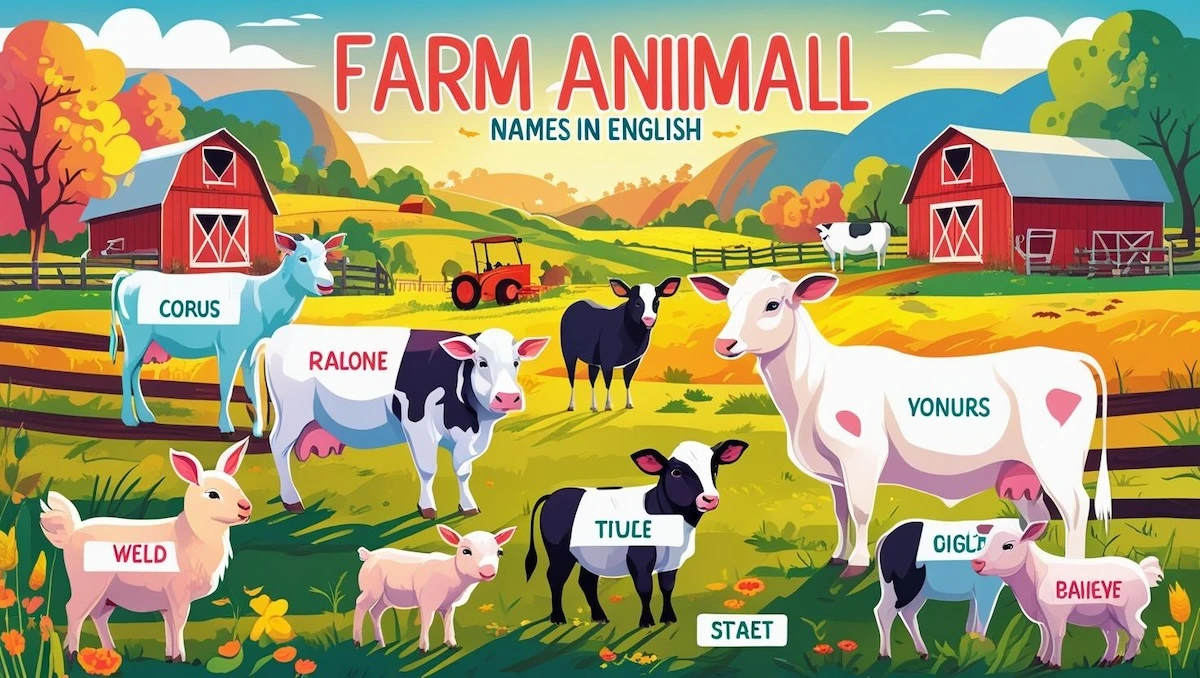When learning English, understanding the names of animals, particularly farm animals, plays a vital role in enhancing your vocabulary. Whether you’re learning English for everyday communication or preparing for the International English Test, knowing the names of farm animals, their young ones, body parts, and behaviors can enrich your language proficiency.
What Are Farm Animals?
Farm animals are domesticated animals that are typically raised for food, labor, or other products such as wool, milk, and eggs. In this article, we’ll explore common farm animals and their unique characteristics.
Common Farm Animals and Their Roles
- Cow: A mature female bovine used for milk production.
- Bull: A mature male bovine, often kept for breeding purposes.
- Sheep: Raised for wool and meat (mutton).
- Goat: Known for their milk, meat, and hair.
- Pig: Primarily raised for pork production.
- Horse: Used for transportation, work, and sometimes meat.
- Donkey: Endurance animals used in various labor tasks.
- Chicken: Poultry raised for eggs and meat.
- Duck: Waterfowl raised for meat, eggs, and down.
- Turkey: Large poultry birds mainly raised for meat.
- Rabbit: Raised for meat and fur.
- Geese: Raised for their meat, eggs, and feathers.
- Llama and Alpaca: South American camelids raised for their wool and used for carrying loads.
- Bee: Essential for honey production.
Farm Animal Young Ones
- Calf: Young cow or bull.
- Lamb: Young sheep.
- Kid: Young goat.
- Piglet: Young pig.
- Foal: Young horse or donkey.
- Chick: Young chicken.
- Duckling: Young duck.
- Poult: Young turkey.
- Kit: Young rabbit.
- Gosling: Young goose.
- Cria: Young llama or alpaca.
- Leveret: Young hare.
- Puppy: Young dog.
- Kitten: Young cat.
- Larva: Young bee.
Farm Animal Body Parts
Understanding the body parts of animals helps describe their behavior and needs more accurately. Here’s a guide to common animal body parts:
- Snout: Pigs’ noses and mouths.
- Beak: Hard mouths of birds like chickens.
- Horn: Bony growths on goats and bulls’ heads.
- Udder: Milk-producing organ in cows and goats.
- Wattle: Fleshy part of turkeys hanging from their necks.
- Feather: Birds’ body coverings.
- Hoof: The hard foot of animals like cows and horses.
- Mane: Long hair along a horse’s neck.
- Comb: Crest on chickens’ heads.
- Tusks: Protruding teeth of pigs.
Farm Animal Behaviors and Actions
Farm animals display various behaviors and actions, and understanding them can enrich your English language skills:
- Grazing: Eating grass or pasture.
- Pecking: Birds using their beaks to pick up food.
- Rooting: Pigs digging for food.
- Nesting: Birds or rabbits preparing a safe place for eggs or young ones.
- Stampeding: A group of animals rushing in a panic.
- Bleating: The sound made by goats and sheep.
- Neighing: The sound of a horse.
- Oinking: The sound of pigs.
- Gobbling: The sound of turkeys.
Farm Animal Habitats and Shelters
Different farm animals need different habitats for comfort and safety:
- Barn: Used for grain and livestock.
- Stable: For keeping horses.
- Coop: Housing for poultry like chickens.
- Sty: A pen for pigs.
- Hutch: Small cages for rabbits.
- Pasture: A grazing area for livestock.
- Paddock: Small enclosed area for horses.
- Kennel: Small house for a dog.
Farm Animal Nutrition and Feed
Farm animals have specific dietary needs that must be met to ensure health and productivity:
- Hay: Dried grass used for livestock feed.
- Silage: Fermented fodder for ruminants.
- Grain: Small hard seeds like wheat, corn, and oats.
- Forage: Plant materials consumed by grazing animals.
- Pellets: Compressed nutrient-rich animal feed.
- Layer Feed: Specialized feed for egg-laying poultry.
Farm Animals in English Idioms
Farm animals play a role in some of the most popular English idioms:
- “Don’t count your chickens before they hatch”: Don’t assume something will happen until it does.
- “Like a bull in a china shop”: Someone who is clumsy or careless.
- “The early bird catches the worm”: Those who start early are more likely to succeed.
- “Till the cows come home”: For a very long time.
Conclusion
Learning about farm animals in English not only enhances your vocabulary but also enriches your understanding of the world of agriculture. From animal names and behaviors to body parts and idioms, this knowledge provides a deeper connection to English, which is essential for both casual and formal communication.
By incorporating farm animal-related terms into your language practice, you’ll improve your English fluency, making it easier to engage in conversations, understand English media, and perform well in English proficiency tests such as the International English Test. Keep exploring and expanding your vocabulary for success!

